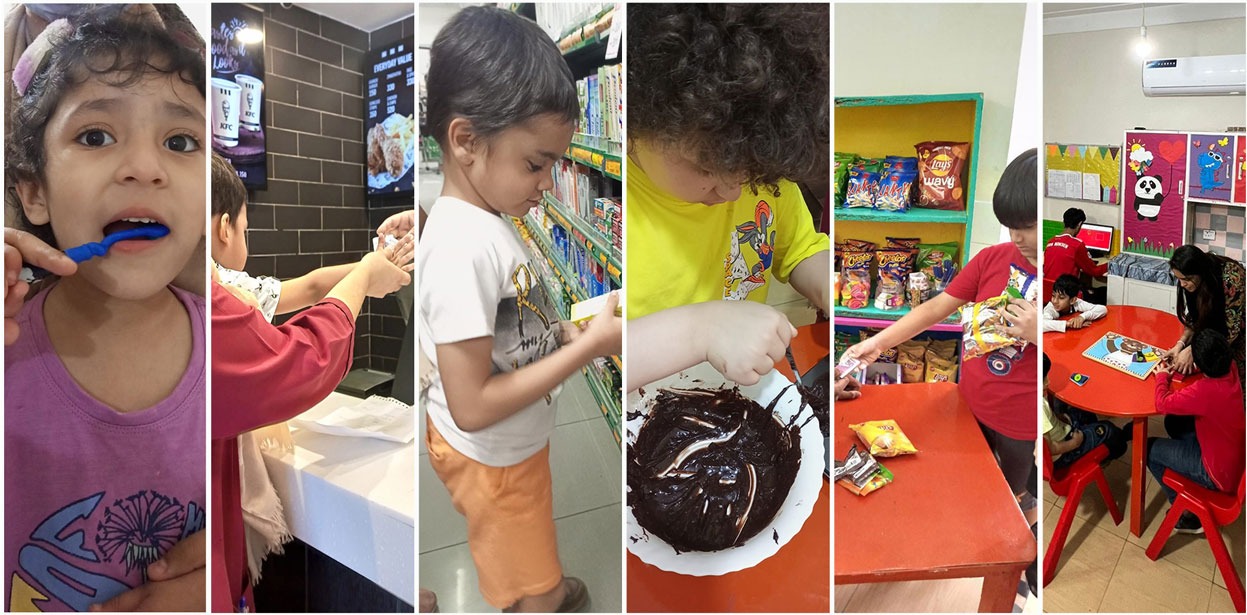Be independent and enjoy life fully through EFL!
It is critical for children to have the necessary skills needed to navigate everyday life. The Autism care centre has recently started a new program dedicated to life skills development, based on a scientific approach established in the ABA program known as Essential functional living – EFL. The purpose of this program shall be to ensure our children become independent.. There is strong evidence that shows that the Essential functional living skills are effective not just for mild cases but prove to be successful in working for moderate to severe levels, and improvements are noted in emotional, physical, or intellectual challenges. In our Essential functional living skills programs we are focusing. skills extending into a wide range of areas like self-care/personal hygiene, domestic, community, pre-vocational, vocational recreational, social, and behavior. The acquisition of functional/daily living skills should be targeted at an early age and prolonged into adulthood through strategies, planning, and proper systematic assessment. At the heart of the EFL program we help children cultivate abilities such as practicing to wait and to accept no for an answer and gain awareness of health and safety protocols for self-care.
People often take for granted their ability to interact with the world. Typically a child or an adult interacts with the world around them by listening and speaking, having to practice tolerance, understanding the need to wait and doing particular actions such as brushing their teeth and sorting their clothes. Whereas on the other hand, children with developmental delays and learning issues struggle with these elements of living. Therefore, this program aims to provide a well rounded approach in addressing your child’s development by not just focussing on your child’s learning ability but to also ensure they are able to go through the world with communication skills and awareness of everyday challenges. Our hope is for the children to be self-sufficient to the best of their capability to provide some respite to parents who work tirelessly to cater to their children’s special needs.
Children do not know how to convey their basic needs by using words, instead of knowing how to make requests for what they want they shout, cry and scream and it is hard for any child to practice waiting. In developing these qualities and life skills we take into consideration the child’s level of standing and their stage of severity to ensure the EFL plan’s we develop are appropriate and specialized. Evidence shows that toddlers imitate the actions of adults around them and learn self-care skills by observing their parents, siblings, grandparents and caregivers at large which can also include the house help.
Children with a diagnosis need assisted practice and attention to learn primary life skills. So, the EFL program allows kids to learn and take care of their basic or self-related needs so that they can become independent individuals. Some EFL functional skills are related to the health and safety domain. Health-related events can be medical conditions (dental appointment, use of first aid, choosing dress according to weather, etc.) Safety-related circumstances i.e., avoiding dangerous places and objects, road safety, use of different products, discrimination between, use of seat belt, helmet, etc.
We are happy to provide more details to you about this program and its design and our team is always present to discuss how your child can benefit from this program. Your input is also appreciated and will help in developing our plans.
Details about the EFL program:
Most skill-building activities are related to the health and safety domain:
- Health-related events can be medical conditions (dental appointment, use of first aid, choosing dress according to weather, etc)
- Safety-related circumstances i.e., avoiding dangerous places and objects, road safety, use of different products, discrimination between, use of seat belt, helmet, etc
- With a spoon or taking care of their personal hygiene like brushing, hand washing, nail cutting, use the toilet, etc
- Using step by step exposure by taking children on guided trips with our therapists and security to visit public places such as restaurants and stores. We aim to build confidence in children as well as in parents so make it possible and easier for them to take their children out with to social events and settings
- We at impact recognize that society at large, does not have the necessary awareness special needs children with a diagnosis or adults require. Our intention is to use evidence based tools that are developed using statistical analysis to take the necessary steps needed towards providing our kids with a better place and environment. understand and apply in daily life events such as dressing up, pouring water, eating




